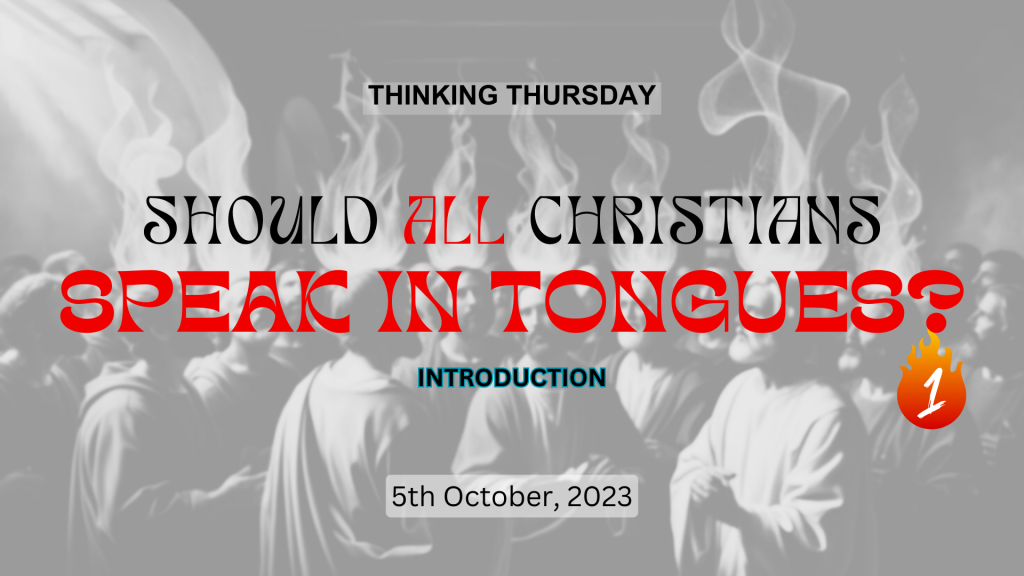There have been a lot of debates in Christianity about the matter of speaking in tongues.
Questions like: Is speaking in tongues evidence of the Holy Spirit baptism? Is it a gift that Christians can have now, or is it one of those gifts that have passed away? How can I learn to speak in tongues?
However, the most popular question asked about this topic in the body of Christ is this: Is speaking in tongues necessary for every Christian?
And this is what we shall be considering on this week’s episode of Thinking Thursday.
Before we dive into the answers, let’s take a look at what speaking in tongues is all about.
It all began on the day of Pentecost…
READ ALSO: CESSATIONISM
The Day Pentecost
Acts 2:1-4, 6-8, 11 When the day of Pentecost came, they were all together in one place. Suddenly a sound like the blowing of a violent wind came from heaven and filled the whole house where they were sitting. They saw what seemed to be tongues of fire that separated and came to rest on each of them. All of them were filled with the Holy Spirit and began to speak in other tongues as the Spirit enabled them. When they heard this sound, a crowd came together in bewilderment, because each one heard their own language being spoken.
Utterly amazed, they asked: “Aren’t all these who are speaking Galileans? Then how is it that each of us hears them in our native language?…(both Jews and converts to Judaism); Cretans and Arabs-we hear them declaring the wonders of God in our own tongues!”
READ ALSO: THE CHURCH: A SCHOOL OR A FAMILY?
Definitions
The Greek word translated as ‘tongues’ in the passage above is ‘dialektos’, and it is the same word translated as ‘language’. It means a mode of conversation, speech, discourse or language that is peculiar to any people. It is the same word from which ‘dialect’ is gotten. Another Greek word translated as ‘tongues’ is ‘glossa’ which means the part of the body we know as a tongue, and also, a language or dialect used by a particular people, distinct from that of other nations.
So, when the Bible says that the people spoke in tongues, it simply means that they spoke in different languages, as the Holy Spirit empowered them. When Paul says in 1 Corinthians 13:1, “If I speak in the tongues of men, and of angels…”, he simply meant, “If I speak in the languages of men or the languages of angels…”
In Acts 2, we see that the Holy Spirit came on the disciples on the day of Pentecost.
READ ALSO: THE DOMINION MANDATE (PART 1)
The Feast of Pentecost
The Feast of Pentecost or Weeks is the second major feast of God which He gave to the Jews to celebrate (the other two being the feasts of Passover and Tabernacles/Booths – See Deuteronomy 16:1-17, Leviticus 23:4-37).
On these appointed days, the Israelites were to appear before the Lord and observe sabbaths in the manner that the Lord prescribed. [You can learn more about the Feasts of God from my message(s) here.
The Feast of Passover was fulfilled when the Lord Jesus – the Lamb of God which takes away the sins of the world; John 1:29, 36 – died on the cross. The Feast of Pentecost was fulfilled when the Holy Spirit, the promise of the Father, was given to all believers. Contrary to what some Christian groups believe, the Holy Spirit did not go back to heaven after the death of the apostles of Jesus.
READ ALSO: CHURCH DISCIPLINE (PART 1)
The Gift of the Holy Spirit
In John 14:15-18 the Lord Jesus says, “If you love me, keep my commands. And I will ask the Father, and He will give you another advocate to help you and be with you forever- the Spirit of truth. The world cannot accept him, because it neither sees him nor knows him. But you know him, for he lives with you and will be in you. I will not leave you as orphans; I will come to you.
Acts 2:37-39 also tells us: When the people heard this, they were cut to the heart and said to Peter and the other apostles, “Brothers, what shall we do?”
Peter replied, “Repent and be baptized, every one of you, in the name of Jesus Christ for the forgiveness of your sins. And you will receive the gift of the Holy Spirit. The promise is for you and your children and for all who are far off, for all whom the Lord our God will call.”
So, first, we see that the promise of the Holy Spirit is for EVERYONE that the Lord our God will call; not only for a select group of people.
Now, how does speaking in tongues, or better put, speaking in other languages, come in?
In the next article, maybe we’ll see.
